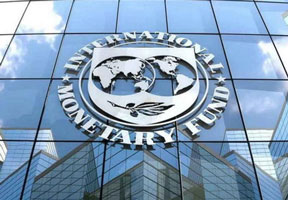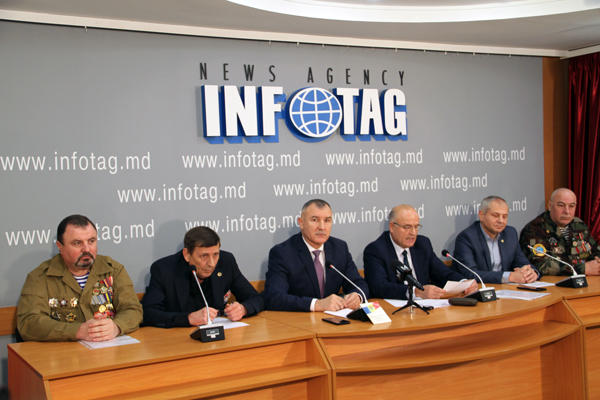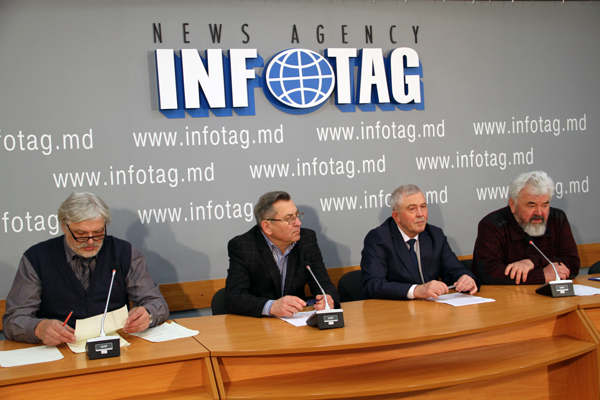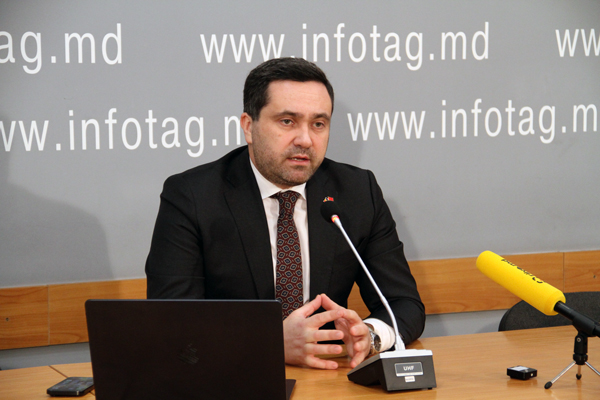Interview
THE PROGRAM OF MOLDOVA WITH THE IMF IS READY, BUT THE SIGNING BY THE CURRENT GOVERNMENT IS UNDER A BIG QUESTION
 Part 1. An insurmountable obstacle in signing the program with the IMF - the approval of the vice-presidents of the National Bank
Part 1. An insurmountable obstacle in signing the program with the IMF - the approval of the vice-presidents of the National Bank
The International Monetary Fund (IMF) is a partner about whom, in relation to Moldova, we can say that “happiness is not in the money”, although they, of course, are of great importance for maintaining the country's balance of payments. For Moldova, cooperation with the IMF has always been of strategic importance, since it was an important indicator for external partners. They are guided by the IMF, believing that if a country has a Program with the IMF, then, at least at the macroeconomic level, the country's policy will be predictable. And this means that it is possible to carry out financing, issue loans, implement investment projects.
The existence of the Memorandum with the Fund for Moldova all these years served as a kind of traffic light, which was lit with a "green light" on the way of foreign investments in the economy of the republic. For example, having a Program with the IMF in 2015, Moldova was for the first time able to use such a financial instrument as the issue of government securities (GS). With their help, the Ministry of Finance has been covering the gap in the balance of payments all these years. In contrast to the current situation on the government securities market, in the 1990s these securities were mainly bought by foreign investors, for whom the “green light” of the IMF served as a guarantor that Moldova would not collapse the rate of the national currency, and investors would not lose government securities when redeeming.
The history of relations between the Moldovan authorities and the IMF knows many cases when the partnership with the Fund was problematic. There were times when the authorities categorically declared, for example, that they would not run like "goats for a carrot offered by the IMF." The top leadership of the Republic of Moldova at that time believed that the structural reforms proposed by the IMF were not suitable for the country, and therefore Moldova did not agree to cooperate with the fund on its terms, when it was ready to provide concessional long-term financing in exchange for reforms. However, after a while, the authorities realized that without the "green light" from the IMF, it would be difficult to establish partnerships with other international financial institutions. For them, Moldova's lack of a program with the IMF created discomfort, primarily associated with increased risk - financial and political.
There were also dramatic moments in the cooperation between the government and the National Bank with the IMF, when the fate of a new cooperation program or the implementation of an existing program hung literally in the balance. For example, what were the statements of high-ranking officials in the government that, for example, the country did not need a program with the IMF in a parliamentary election year. The authorities did not speak openly about this, but proceeded from the fact that if there was a program with the IMF, the government would not be able to spend money at its own discretion, generously endowing with social benefits in an election year. This was the case, for example, in 2013-2014, when the banking system was brought to an abyss by stealing $ 1 billion from Banca de Economii, Banca Sociala and Unibank. There was no Program in the current presidential election campaign, when, despite the pandemic and the budget deficit, the government also resorted to unreasonable social payments to pensioners.
But the country had, of course, pleasant and successful examples of partnership with the IMF. That, for example, stood the government of Ion Chicu to complete in four months the extended previous program with the fund, which was successfully completed on March 31, 2020.
Experts pay tribute to Prime Minister Chicu, recognizing the skill and ability of his government to quickly negotiate with the IMF on a new program for 2020-2023. The government had the hope that the IMF Executive Board of Directors would approve the program with a loan of $ 558 million on September 16, 2020. However, this could not happen, and the government and parliament are to blame. An emergency parliamentary meeting was not convened in August, as the Moldovan authorities had promised the IMF. And the conditions were not met on time, which made it impossible to approve a new Program with the IMF in September. The adoption of a number of laws agreed with the IMF on September 10-11 could no longer save the situation, since these laws did not even give way into force.
In addition, the government did not open brackets about other preconditions of the fund regarding important decisions. One of them is directly related to the National Bank (NBM), and is linked to the adoption of a law consolidating its independence, as well as the approval of three vice-presidents of the bank, whose positions have been vacant since this summer.
The preconditions were hushed up because there was disagreement in the corridors of power over these fund terms. Moreover, they concerned both the strengthening of the NBM's independence and the appointment of its vice-presidents. The parliament, the presidential administration and the government had their own views, which did not coincide with what the foundation insisted on, making it clear that without fulfilling its conditions, a new program would be approved.
At the end of November, the optimism of Prime Minister Chicu, who had practically no doubt that the program would be approved by the end of 2020, noticeably diminished.
“It's hard for me to say whether the program with the IMF will be approved. This is due to the fact that not all the conditions of the fund are met. The government has done its job, but not everything has been done in parliament. Three vice-presidents of the NBM have not yet been approved. As I understand it, the parliament has questions to the candidates proposed by the president of the bank, Octavian Armashu. Not all of them meet the required criteria. The IMF is closely monitoring this. Although the fund is flexible, they will not make exceptions for Moldova, and they will not wait either. If we do not fulfill the conditions as soon as possible, then the three-year Program will not be approved by the IMF. Soon the Christmas holidays will come, then we will return to the program only in 2021,” said Chicu.
Unlike the prime minister, the incumbent President Igor Dodon in the first decade of December stated in a rather categorical form that Moldova would not have time to sign the Memorandum with the IMF by the end of 2020. “We are already at the end of 2020. Moldova has fulfilled all the preconditions of the fund for signing a new program,” Dodon said, making it clear that the problem with the approval of the program is now being considered at the central office of the fund in Washington, and not in Chisinau.
THE PROGRAM OF MOLDOVA WITH THE IMF IS READY, BUT THE SIGNING BY THE CURRENT GOVERNMENT IS UNDER A BIG QUESTION
Part 2. The political moment requires courage from the NBM President
At the moment when the incumbent President Dodon made this statement, the parliament had not yet approved the vice-presidents of the NBM. Therefore, Moldova has not fulfilled all the conditions of the fund. The reason for the unwanted delay is that the parliament rejected two candidates for the post of Vice-President of the NBM, proposed by the president of the bank.
On December 2, the Standing Parliamentary Commission on Legal Issues, Appointments and Immunities approved the candidacy of Alexander Sava for the post of Vice President of the NBM. It should be noted that the president of the bank, Octavian Armashu, sent his candidacy to parliament for the opening of the autumn-winter session, but the deputies did not consider it all this time. On two other candidates - Maia Parcalab and Constantin Shkendri - the commission concluded that they did not meet the criteria of the legislation. In this regard, the President of the NBM must present other candidates.
The interlocutor of the INFOTAG correspondent in the parliament, who is closely familiar with the problem of appointing NBM vice-presidents, said that there are no difficulties with the appointment. Everything rests on the president of the bank, who must present the other two candidates, but so that they meet the requirements for these functions. A reliable source of INFOTAG directly linked the parliamentary rejection of the candidatures of Parcalab and Shkendri with the fact that they do not have the necessary work experience in the financial and banking sector.
Sources of the agency in banking circles say that in the summer of 2019, when Maia Sandu was Prime Minister, the candidacy of Vladimir Golovatyuk, Chairman of the Parliamentary Commission on Economy, Budget and Finance from the Party of Socialists, was considered for the post of First Vice President of the NBM. He has the necessary experience, as he worked for many years at the NBM and commercial banks. But then his appointment did not take place due to the collapse of the ruling majority, created by three parties - the Party of Socialists (Zinaida Greceanii), PAS (Maia Sandu) and DA (Andrei Nastase), and the subsequent resignation of the government.
Given the unclear prospects of the current parliament and its possible dissolution, Octavian Armashu may not be in a hurry to propose new candidates to parliament. A number of experts believe that the current situation allows the President of the NBM to maintain his position in the issue of appointing those candidates that he considers suitable. At least he is helped in this by the law, which stipulates that the right to nominate candidates for the post of the first president and two vice-presidents belongs to the President of the NBM.
A number of experts draw attention to the fact that the classical procedure for appointing vice-presidents of the NBM provides for a consensus in this between the president of the bank and the leadership of the parliament. This means that Armashu proposes candidates who are likely to receive parliamentary approval. And the fact that the NBM President did not nominate candidates for a long time, and then proposed candidates who did not find support from the legislative body, testifies to the disagreements in the positions of the parliament and the NBM.
That is why some experts believe that worthy candidates for the post of vice-president of the bank, whom Armashu will propose, may not agree to be nominated without prior approval from parliament for their approval.
“Understanding the ethical side of this issue, but, at the same time, seeking the appointment of his candidates, Armashu can specially take a timeout so that the approval procedure in the event of early parliamentary elections will be decided by the new composition of deputies,” the source of the IINFOTAG correspondent said.
At the same time, he recalled the legislative initiative of the deputies of the Party of Socialists "On lustration and cleaning the state from oligarchic influence." He believes that its appearance now, after the creation of an unspoken coalition of socialists and the faction of the Shor party, is not at all accidental. In their opinion, this initiative is directed primarily by the leadership of the NBM and the National Commission for the Financial Market. With this law, the socialists want to keep the officials who fall under the law, if it is adopted, in suspense. The authors of the law pursue the goal of removing from their posts those heads of state structures who were appointed with the approval of Vladimir Plahotniuc.
“On June 8, 2019, the parliament adopted the Declaration “On the Occupied State”, assessing everything that happened in Moldova in the period 2016-2019. We propose this project in order to continue de-oligarchization, and not allow the oligarchs to revenge. We propose that persons appointed by the regime from January 20, 2016 to June 8, 2019 should be dismissed,” explained the position of the authors of the project, Vasili Bolea, chairman of the parliamentary commission on legal issues, appointments of immunity.
Having listed all the state departments, the heads of which will be affected in one way or another by the new draft law, he especially focused the attention of journalists on the leadership of the NBM and the NCFM, noting that “the law also applies to the vice-presidents of the NBM”.
But professional participants of the financial market, whose opinion was inquired by the INFOTAG correspondent, predict that the scenario with a delay in time will most likely be realized. And this is due to the fact that Armashu's mandate as President of the NBM expires only in 2026. This means that he and the vice-presidents whom he wants to bring to the bank will have to work together for six whole years. Therefore, Armashu will take advantage of the political moment in the country, and show character. After all, in connection with the initiative of the socialists to lustration "there is nothing to lose." Moreover, Armashu's position is strengthened by three important arguments: the current situation, the provisions of the legislation, the law and support from the IMF.
The last point is of particular importance, since the IMF will certainly approve the bold position of the NBM President on the issue of approving the NBM Vice-Presidents. Moreover, the government almost publicly admits that the IMF has warned that “in case of further actions of the parliament against the National Bank, the IMF will not only not approve a new program with Moldova, but it will freeze relations seriously and for a long time.
Comments [ 1 ] Add Comment
-
Intresting and simple!
























Add Comment